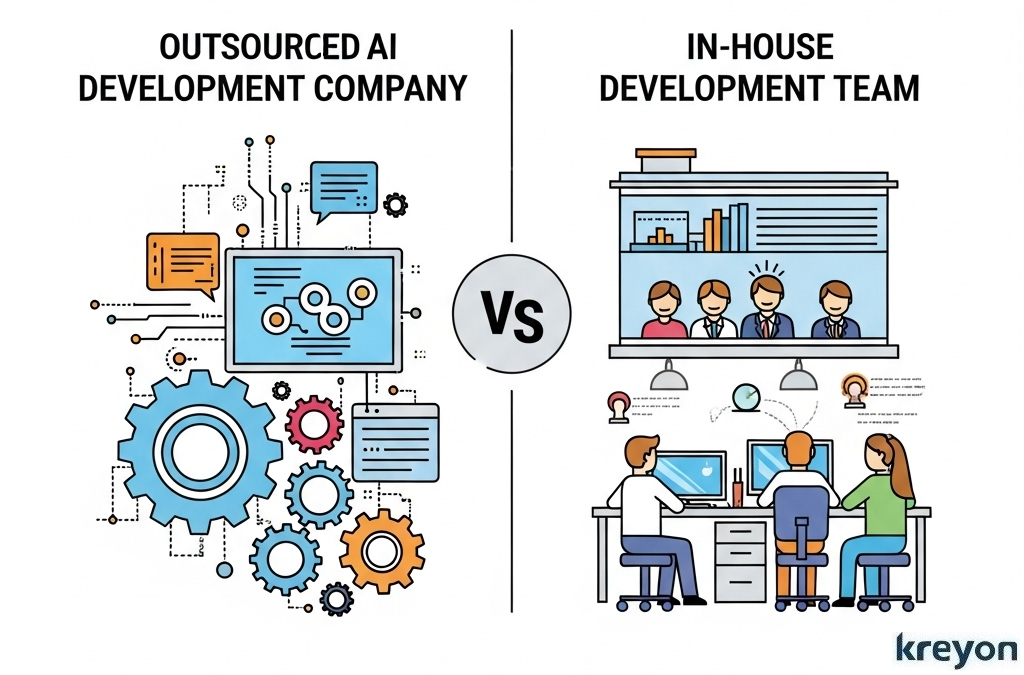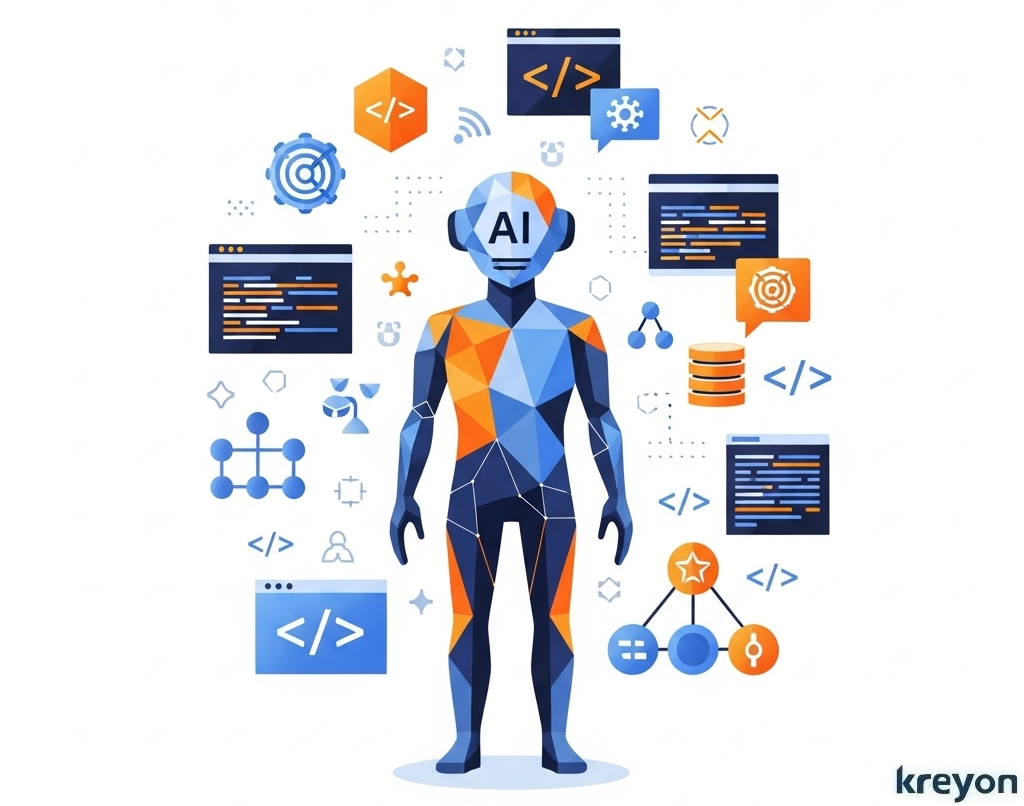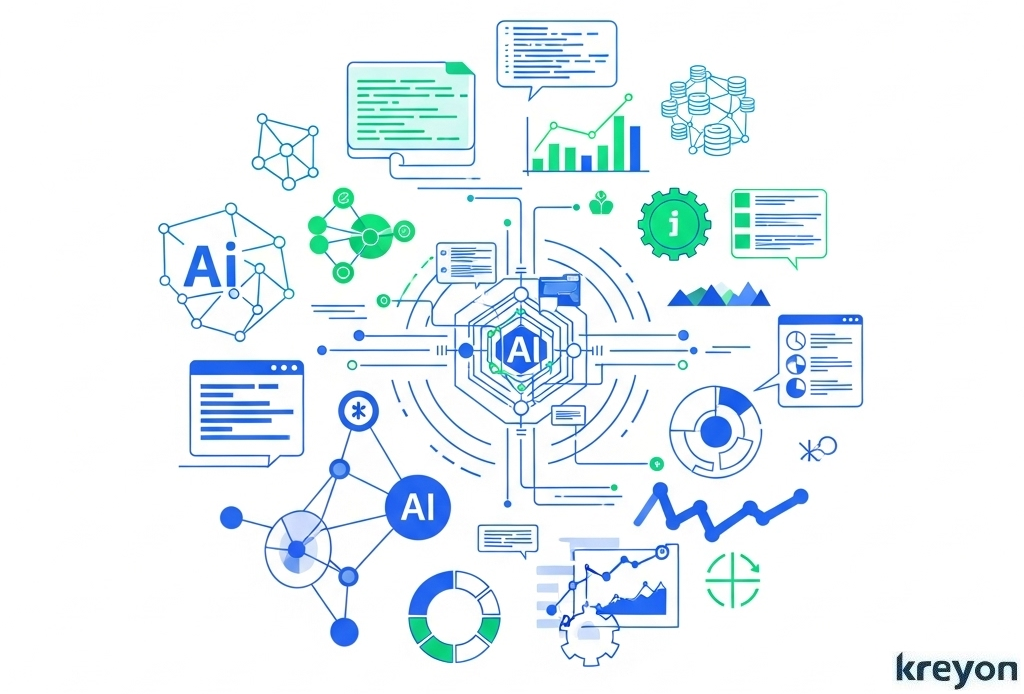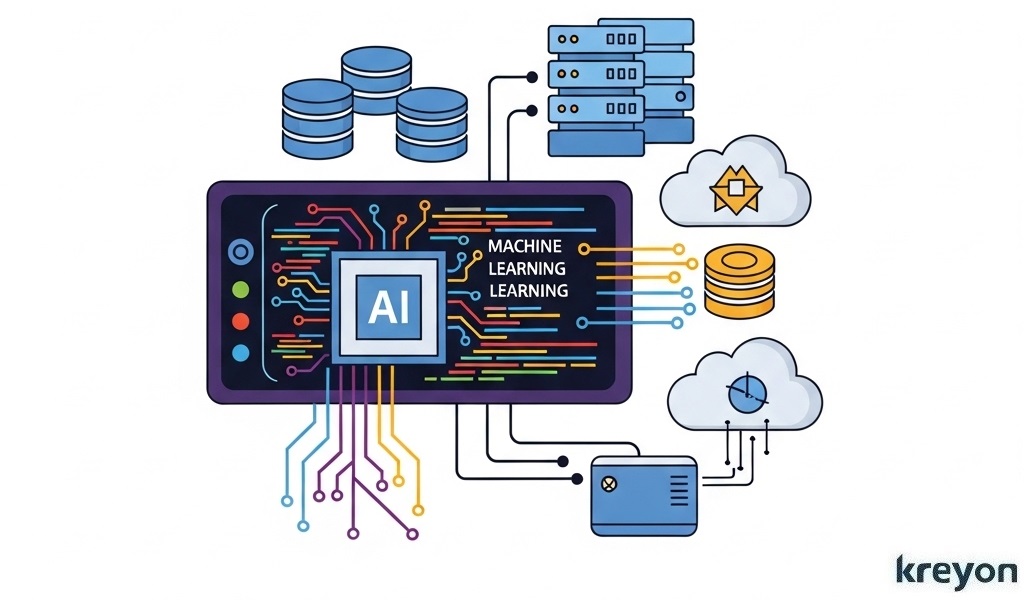AI Software Development Company vs. In-House Team: Which One Delivers Faster Results?

In the race to transform innovative ideas into cutting-edge software, the choice between an AI software development company & an in-house team can make or break your project’s speed and success.
As businesses are racing to integrate artificial intelligence (AI) into their operations to stay competitive. From predictive analytics to natural language processing, AI is transforming industries, streamlining processes, and unlocking new opportunities.
But when it comes to building AI solutions, companies face a critical decision: should they hire an external company or use an in-house team?
Here, we’ll explore the pros and cons of both options, diving deep into timelines, expertise, costs, and scalability to help you make an informed choice.
Developing AI software requires specialized skills, including data science, algorithm design, software engineering, and domain expertise. Speed, quality, and cost are key factors, but the right choice depends on your business’s goals, resources, and timeline. Let’s break down the two approaches.
The Case for an AI Software Development Company

Hiring an AI software development company means partnering with a specialized firm that focuses on delivering AI solutions.
These companies typically have multidisciplinary teams, including data scientists, machine learning engineers, and software developers, with extensive experience in AI projects.
Here’s why outsourcing to an AI software development company can lead to faster results.
1. Access to Specialized Expertise
AI software development companies are staffed with experts who live and breathe AI. They’ve worked on diverse projects across industries, giving them a deep understanding of best practices, frameworks, and tools.
Whether it’s TensorFlow, PyTorch, or custom ML models, these firms have the know-how to hit the ground running. In contrast, building an in-house team often requires hiring and training talent, which can take months.
Even if you have skilled developers, they may lack the specific AI expertise needed for complex projects. An AI software development company can bypass this learning curve, delivering results faster by leveraging their existing knowledge.
2. Time to ROI
Time is money, and AI software development companies are built for speed. Given their speed and efficiency, outsourcing can accelerate time-to-market and thus lead to faster early-stage ROI.
Companies working under a fixed-bid model are incentivized to deliver value quickly. These firms have streamlined processes, from project scoping to deployment, honed through years of experience.
They often use agile methodologies, enabling them to start projects quickly & iterate rapidly.
For businesses with tight deadlines, this can be a game-changer.In-house teams, on the other hand, may need time to define workflows, set up infrastructure, and align on project goals. If your team is starting from scratch, the setup phase alone can delay progress significantly.
3. Scalability and Flexibility
AI software development companies offer scalability that’s hard to match in-house. Need to pivot to a new AI model or scale up development to meet a deadline? External firms can quickly allocate additional resources or bring in specialists as needed.
This flexibility ensures projects stay on track, even when requirements change.In-house teams, while capable, may struggle to scale rapidly. Hiring additional talent or reallocating resources internally can be time-consuming and costly, slowing down development.
4. Access to Cutting-Edge Tools and Technologies
AI software development companies invest heavily in the latest tools, platforms, and technologies. They often have access to proprietary frameworks, pre-built models, and advanced cloud infrastructure, which can accelerate development.
For example, they might use pre-trained models to jumpstart a project, reducing the time needed to train algorithms from scratch.In-house teams may not have the budget or expertise to leverage these tools effectively.
Without access to the same level of resources, development can take longer, especially for complex AI projects.
5. Cost Efficiency for Projects
For businesses looking to develop a one-off AI solution, outsourcing can be more cost-effective. AI software development companies charge based on project scope, allowing you to avoid the long-term costs of hiring and maintaining an in-house team.
This is particularly beneficial for startups or small businesses with limited budgets.However, outsourcing isn’t without its challenges.
Drawbacks of AI Software Development Companies
Some potential drawbacks of outsourcing AI development includes:
Less Control Over the Process: When you outsource, you rely on the external team to manage timelines and deliverables. Miscommunication or misaligned expectations can lead to delays.
Dependency on External Teams: Long-term reliance on a third party can create challenges if you need ongoing support or updates.
Higher Upfront Costs: While outsourcing can save money in the long run for short-term projects, the initial costs of hiring a specialized AI firm can be steep.
The Case for an In-House AI Development

Team Building an in-house AI development team means hiring or training employees to work on AI projects within your organization.
This approach offers unique advantages, particularly for companies with long-term AI ambitions. Here’s why an in-house team might deliver faster results in certain scenarios.
1. Deep Understanding of Your Business
An in-house team is immersed in your company’s culture, goals, and processes. They understand your data, systems, and industry-specific challenges, which can lead to faster development of tailored AI solutions.
For example, an in-house team can quickly integrate AI into existing workflows, as they’re already familiar with your tech stack.AI software development companies, while experienced, may need time to learn your business’s nuances.
This onboarding phase can slow down initial progress, especially for highly customized projects.
2. Greater Control and Collaboration
With an in-house team, you have full control over the development process. You can prioritize tasks, adjust timelines, and collaborate closely with developers to ensure the AI solution aligns with your vision.
This hands-on approach can speed up decision-making and reduce the risk of miscommunication.
Outsourcing, by contrast, often involves coordinating with external teams across time zones, which can introduce delays. If rapid iteration and real-time feedback are critical, an in-house team has the edge.
3. Long-Term Investment in AI Capabilities
Building an in-house team is an investment in your company’s future. Once trained, your team can work on multiple AI projects, iterating and improving solutions over time.
This can lead to faster results for subsequent projects, as your team builds institutional knowledge and expertise.
While an AI software development company can deliver a single project quickly, you may need to rehire them for future work, incurring additional costs and onboarding time.
4. Data Security and Intellectual Property
For industries like healthcare or finance, where data security and intellectual property are paramount, an in-house team offers greater control.
You can implement strict security protocols and ensure sensitive data stays within your organization. This eliminates the risks associated with sharing proprietary information with an external AI software development company.
Drawbacks of an In-House Team
Building an in-house AI development is not a trivial proposition, far from it. Here are some of the things you need to consider.
Time to Build Expertise: Hiring and training AI talent takes time. The global shortage of AI experts can make it challenging to assemble a skilled team quickly.
Higher Long-Term Costs: Salaries, benefits, and ongoing training for an in-house team can be expensive, especially for small businesses.
Resource Constraints: In-house teams may lack access to the same advanced tools and infrastructure as specialized AI firms, potentially slowing development.
Which Option Delivers Faster Results? The answer depends on your business’s specific needs, timeline, and resources.
Let’s break it down by key factors:

1. Project Timeline
If you need results quickly, say, within a few months, an AI software development company is likely the faster option.
Their expertise, streamlined processes, and access to tools allow them to deliver polished solutions rapidly. For longer-term projects (e.g., 12+ months), an in-house team may be faster in the long run, as they can build reusable frameworks and institutional knowledge.
2. Complexity of the Project
For highly complex AI projects requiring specialized skills (e.g., reinforcement learning or generative AI), an AI software development company has the advantage.
They bring niche expertise that in-house teams may lack. For simpler projects, such as integrating off-the-shelf AI APIs, an in-house team can often deliver just as quickly.
3. Budget Constraints
If budget is a concern, outsourcing is often faster and more cost-effective for one-off projects.
However, if you plan to develop multiple AI solutions over time, investing in an in-house team may yield faster results long-term, despite the higher upfront costs.
4. Scalability Needs
If your project requires rapid scaling or frequent pivots, an AI software development company’s flexibility can accelerate delivery. In-house teams may struggle to adapt quickly without additional hiring.
5. Data Sensitivity
For projects involving sensitive data, an in-house team’s control over security can speed up development by avoiding lengthy compliance processes with external vendors.
Making the Right Choice for Your Business
To decide between an AI software development company and an in-house team, ask yourself these questions: What’s your timeline? Tight deadlines favor outsourcing.
How complex is the project? Highly specialized projects benefit from external expertise.
What’s your budget? Short-term projects are often cheaper with an AI software development company, while long-term initiatives may justify an in-house team.
How sensitive is your data? In-house teams offer greater control over security.
Do you need ongoing AI development? An in-house team is ideal for sustained innovation.
When to Choose an AI Software Development Company
✅ You need a fast proof of concept
✅ Your internal team lacks AI expertise
✅ You want to test the waters before long-term investment
✅ Your project has a defined scope and limited iterations
✅ You need multi-disciplinary talent (e.g., data science + UX + DevOps) quickly
When to Build an In-House AI Team
✅ AI is central to your long-term strategy
✅ You want full control over IP and data
✅ You plan to continuously iterate and improve your models
✅ You operate in a highly regulated industry
✅ You already have the internal data infrastructure in place
Hybrid Models: The Best of Both Worlds?
Some organizations combine both strategies, bringing in an AI development company to kickstart projects while gradually building an internal team to take over.
This hybrid model offers a runway for knowledge transfer, reducing the time to results without compromising on long-term capabilities.
Conclusion
Both AI software development companies and in-house teams have unique strengths when it comes to delivering fast results. An AI software development company offers speed, expertise, and scalability, making it ideal for businesses with tight timelines or limited internal resources.
Ultimately, the choice depends on your business’s priorities. Whether you choose to outsource or build in-house, the key is to align your decision with your strategic goals to maximize the impact of AI software development.
Unlock next-gen capabilities with Kreyon Systems AI solutions. We partner with companies to engineer intelligent software solutions, ensuring your future-ready growth. If you have queries, please contact us.
